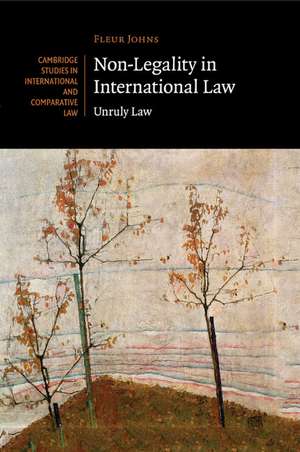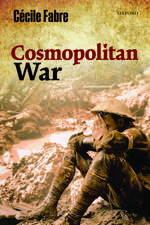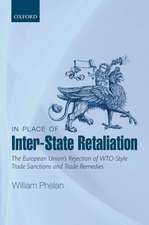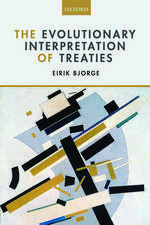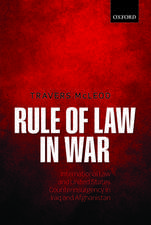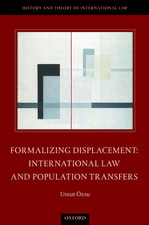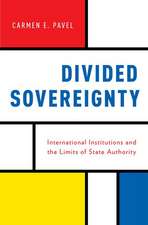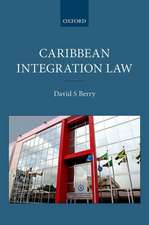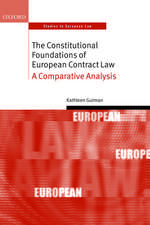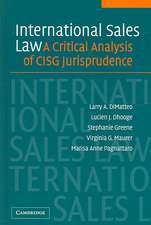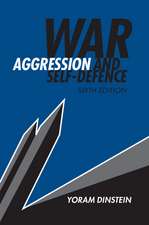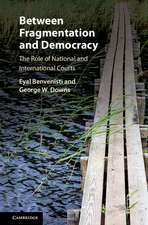Non-Legality in International Law: Unruly Law: Cambridge Studies in International and Comparative Law
Autor Fleur Johnsen Limba Engleză Paperback – 8 apr 2015
| Toate formatele și edițiile | Preț | Express |
|---|---|---|
| Paperback (1) | 284.78 lei 6-8 săpt. | |
| Cambridge University Press – 8 apr 2015 | 284.78 lei 6-8 săpt. | |
| Hardback (1) | 725.57 lei 6-8 săpt. | |
| Cambridge University Press – 2 ian 2013 | 725.57 lei 6-8 săpt. |
Din seria Cambridge Studies in International and Comparative Law
- 9%
 Preț: 731.44 lei
Preț: 731.44 lei -
 Preț: 176.91 lei
Preț: 176.91 lei -
 Preț: 200.33 lei
Preț: 200.33 lei - 9%
 Preț: 661.94 lei
Preț: 661.94 lei -
 Preț: 231.74 lei
Preț: 231.74 lei -
 Preț: 233.37 lei
Preț: 233.37 lei - 9%
 Preț: 661.79 lei
Preț: 661.79 lei -
 Preț: 201.39 lei
Preț: 201.39 lei -
 Preț: 230.94 lei
Preț: 230.94 lei - 9%
 Preț: 1013.73 lei
Preț: 1013.73 lei - 9%
 Preț: 765.90 lei
Preț: 765.90 lei -
 Preț: 237.53 lei
Preț: 237.53 lei - 9%
 Preț: 773.84 lei
Preț: 773.84 lei -
 Preț: 329.28 lei
Preț: 329.28 lei - 14%
 Preț: 793.62 lei
Preț: 793.62 lei -
 Preț: 238.11 lei
Preț: 238.11 lei - 9%
 Preț: 596.72 lei
Preț: 596.72 lei - 9%
 Preț: 593.36 lei
Preț: 593.36 lei -
 Preț: 209.39 lei
Preț: 209.39 lei - 9%
 Preț: 917.65 lei
Preț: 917.65 lei -
 Preț: 239.72 lei
Preț: 239.72 lei -
 Preț: 238.11 lei
Preț: 238.11 lei - 11%
 Preț: 639.92 lei
Preț: 639.92 lei -
 Preț: 350.03 lei
Preț: 350.03 lei - 14%
 Preț: 784.65 lei
Preț: 784.65 lei -
 Preț: 310.86 lei
Preț: 310.86 lei - 14%
 Preț: 731.56 lei
Preț: 731.56 lei - 14%
 Preț: 698.80 lei
Preț: 698.80 lei - 14%
 Preț: 700.76 lei
Preț: 700.76 lei -
 Preț: 288.04 lei
Preț: 288.04 lei - 14%
 Preț: 757.69 lei
Preț: 757.69 lei - 14%
 Preț: 721.96 lei
Preț: 721.96 lei - 11%
 Preț: 642.00 lei
Preț: 642.00 lei - 14%
 Preț: 896.01 lei
Preț: 896.01 lei -
 Preț: 358.28 lei
Preț: 358.28 lei - 9%
 Preț: 662.73 lei
Preț: 662.73 lei - 14%
 Preț: 759.18 lei
Preț: 759.18 lei - 14%
 Preț: 703.42 lei
Preț: 703.42 lei -
 Preț: 363.28 lei
Preț: 363.28 lei -
 Preț: 464.33 lei
Preț: 464.33 lei - 14%
 Preț: 786.15 lei
Preț: 786.15 lei
Preț: 284.78 lei
Nou
Puncte Express: 427
Preț estimativ în valută:
54.49€ • 57.16$ • 45.36£
54.49€ • 57.16$ • 45.36£
Carte tipărită la comandă
Livrare economică 01-15 aprilie
Preluare comenzi: 021 569.72.76
Specificații
ISBN-13: 9781107521834
ISBN-10: 1107521831
Pagini: 282
Ilustrații: black & white illustrations
Dimensiuni: 152 x 229 x 15 mm
Greutate: 0.38 kg
Editura: Cambridge University Press
Colecția Cambridge University Press
Seria Cambridge Studies in International and Comparative Law
Locul publicării:New York, United States
ISBN-10: 1107521831
Pagini: 282
Ilustrații: black & white illustrations
Dimensiuni: 152 x 229 x 15 mm
Greutate: 0.38 kg
Editura: Cambridge University Press
Colecția Cambridge University Press
Seria Cambridge Studies in International and Comparative Law
Locul publicării:New York, United States
Cuprins
1. Making non-legalities in international law; 2. Illegality and the torture memos; 3. Black holes and the outside within: extra-legality at Guantánamo; 4. Doing deals: pre- and post-legal choice in transnational financing; 5. Receiving climate change: law, science and supra-legality; 6. Death, disaster and infra-legality in international law; Conclusion.
Recenzii
'A fantastic book - at once a serious contribution to legal theory and a fascinating read. 'The exception makes the rule' we say - Johns turns that around. How does law make, un-make and manage the exception? It has become routine to find war in the filigrees of peace. Johns finds the managerial work of law in all that seems beyond its reach - the illegal, the political, the economic and the barbaric. Johns proposes a powerful new agenda for research and a caution about the common wish that all might be well were law finally 'brought to bear.' Law she tells us, is already there.' David Kennedy, Manley O. Hudson Professor of Law and Director of the Institute for Global Law and Policy, Harvard Law School
'An outstandingly rich, nuanced and well written critical treatment of the way in which international law's treatment of conditions as marginal plays a significant role in the understanding and structuring of such conditions.' Ralph Wilde, Reader in Law, University College London
'This magisterial book points the way toward a new future for international legal studies. Erudite yet original, bold yet meticulously defended, this is a text that is both critical and hopeful, in the highest sense of both terms.' Annelise Riles, Jack G. Clarke Professor of Law in Far East Legal Studies, Cornell University Law School
'Beautifully written and full of sparkling examples, this book reconfigures the landscape of international legal thought in profound and irrevocable ways.' Susan Marks, Professor of International Law, London School of Economics and Political Science
'Non-Legality in International Law is as successful as it is ambitious … Johns charts the path, not only toward a productive research agenda for critically minded scholars of international law, but also toward a more self-conscious, less anxious, and more experimental approach to international legal practice.' John T. Parry, Law and Society Review
'… disturbs assumptions about what we understand as 'real law', while providing openings for new ways of thinking about and governing through and beyond legislated or judge-made law … makes an important contribution. This is not simply because it extends and refines analysis of 'excluded legalities' beyond the areas that have been the main focus of similar work - although, in itself, this is a major contribution to socio-legal scholarship. Rather, it is because it makes so clear the consequences of such exclusion for scholarship that seeks to engage with political action … This book has implications for all socio-legal analysis and practice.' Pat O'Malley, Current Issues in Criminal Justice
'… an intriguing and ambitious critique of the way in which international law scholars and practitioners are constrained to understand the effect that non-legality has in generating new, normative conceptions of international law … is likely to inspire robust debate within the international and comparative academic community.' Christopher P. Banks, Law and Politics Book Review
'… [Johns'] approach is deeply informed by contributions from a variety of fields ranging from cultural anthropology and sociology to comparative law and science and technology studies. But her book forges new conceptual ground through her focus on the non-legal - that is, 'the before, the after, the below, the above, the against and the despite, which international legal work ceaselessly evokes'.' Eudes Lopes, meridian-180.org
'In a most novel, interesting and compelling way, Fleur Johns's new book, Non-Legality in International Law: Unruly Law, tests the question of the boundedness of law and legal practice and the possibilities of critique … the book is an exemplar of what it might be possible to think in international law and invites further reflection on what it might be possible to do.' Richard Joyce, Leiden Journal of International Law
'An outstandingly rich, nuanced and well written critical treatment of the way in which international law's treatment of conditions as marginal plays a significant role in the understanding and structuring of such conditions.' Ralph Wilde, Reader in Law, University College London
'This magisterial book points the way toward a new future for international legal studies. Erudite yet original, bold yet meticulously defended, this is a text that is both critical and hopeful, in the highest sense of both terms.' Annelise Riles, Jack G. Clarke Professor of Law in Far East Legal Studies, Cornell University Law School
'Beautifully written and full of sparkling examples, this book reconfigures the landscape of international legal thought in profound and irrevocable ways.' Susan Marks, Professor of International Law, London School of Economics and Political Science
'Non-Legality in International Law is as successful as it is ambitious … Johns charts the path, not only toward a productive research agenda for critically minded scholars of international law, but also toward a more self-conscious, less anxious, and more experimental approach to international legal practice.' John T. Parry, Law and Society Review
'… disturbs assumptions about what we understand as 'real law', while providing openings for new ways of thinking about and governing through and beyond legislated or judge-made law … makes an important contribution. This is not simply because it extends and refines analysis of 'excluded legalities' beyond the areas that have been the main focus of similar work - although, in itself, this is a major contribution to socio-legal scholarship. Rather, it is because it makes so clear the consequences of such exclusion for scholarship that seeks to engage with political action … This book has implications for all socio-legal analysis and practice.' Pat O'Malley, Current Issues in Criminal Justice
'… an intriguing and ambitious critique of the way in which international law scholars and practitioners are constrained to understand the effect that non-legality has in generating new, normative conceptions of international law … is likely to inspire robust debate within the international and comparative academic community.' Christopher P. Banks, Law and Politics Book Review
'… [Johns'] approach is deeply informed by contributions from a variety of fields ranging from cultural anthropology and sociology to comparative law and science and technology studies. But her book forges new conceptual ground through her focus on the non-legal - that is, 'the before, the after, the below, the above, the against and the despite, which international legal work ceaselessly evokes'.' Eudes Lopes, meridian-180.org
'In a most novel, interesting and compelling way, Fleur Johns's new book, Non-Legality in International Law: Unruly Law, tests the question of the boundedness of law and legal practice and the possibilities of critique … the book is an exemplar of what it might be possible to think in international law and invites further reflection on what it might be possible to do.' Richard Joyce, Leiden Journal of International Law
Notă biografică
Descriere
Shows how international lawyers make non-law (extra-legal, illegal and other non-legal phenomena) and why this matters in global politics today.
